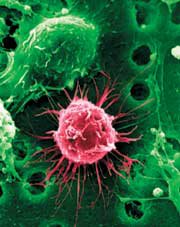
Brent Thomas over at Colossians Three Sixteen has a powerful argument against stem cell destruction based on James 4:2.
"You desire and do not have, so you murder.
You covet and cannot obtain,
so you fight and quarrel.
You do not have, because you do not ask."
I agree with Thomas. This lifts the matter from the scientific to the theological. The sin issue is of greater important than the legal one. We cannot legislate the disposition of the human heart. That change can only be wrought by the Spirit of God.
In addition Thomas, addresses the human element in the debate by offering a perspective from Paul's word to the Philippians.
This is an excellent post that deserves a wider audience. Check it out and wrestle with its implications.
You covet and cannot obtain,
so you fight and quarrel.
You do not have, because you do not ask."
Rather than engage in the traditional arguments (which are absolutely valid) against abortion, Piper engages James 4:2, which reads: You desire and do not have, so you murder. You covet and cannot obtain, so you fight and quarrel. You do not have, because you do not ask. In other words, abortion is the direct result of women wanting a life they think a child will not provide them, and they are willing to murder in the process. This is a powerful argument because it does not get side-tracked in the "when does life begin" discussion. Rather, it cuts right to the heart of the issue which is pride resulting in murder...The question is this: does the same line of argumentation apply, that if abortion is pride resulting in murder, desiring a different life and killing to get it, does the same argument apply to stem cells...The question thus shifts from whether or not they will be destroyed to whether or not we have right to them in the first place. The bottom line is that if we allow for stem cell research, we are allowing for the destruction of these embryos, which it seems falls under the ban of James 4:2. We want desperately to have scientific advances and we are willing to sacrifice life to get it. These are not easy conclusions, but I am becoming convinced that they are consistent ones.
I agree with Thomas. This lifts the matter from the scientific to the theological. The sin issue is of greater important than the legal one. We cannot legislate the disposition of the human heart. That change can only be wrought by the Spirit of God.
In addition Thomas, addresses the human element in the debate by offering a perspective from Paul's word to the Philippians.
To begin with, we have the clear principle that believers are to be content in all circumstances, whether in strength or in weakness (2 Corinthians 12:10). We, like Paul must learn to be content in all circumstances (Philippians 4:11), knowing that if we have food and clothing, we have no excuse to not be content (1 Timothy 6:8), because God will never leave or forsake us (Hebrews 13:5) and that there is "great gain in godliness with contentment" (1 Timothy 6:6). This call to contentment naturally applies to those who are ill and might benefit from stem cell research.
This is an excellent post that deserves a wider audience. Check it out and wrestle with its implications.
No comments:
Post a Comment